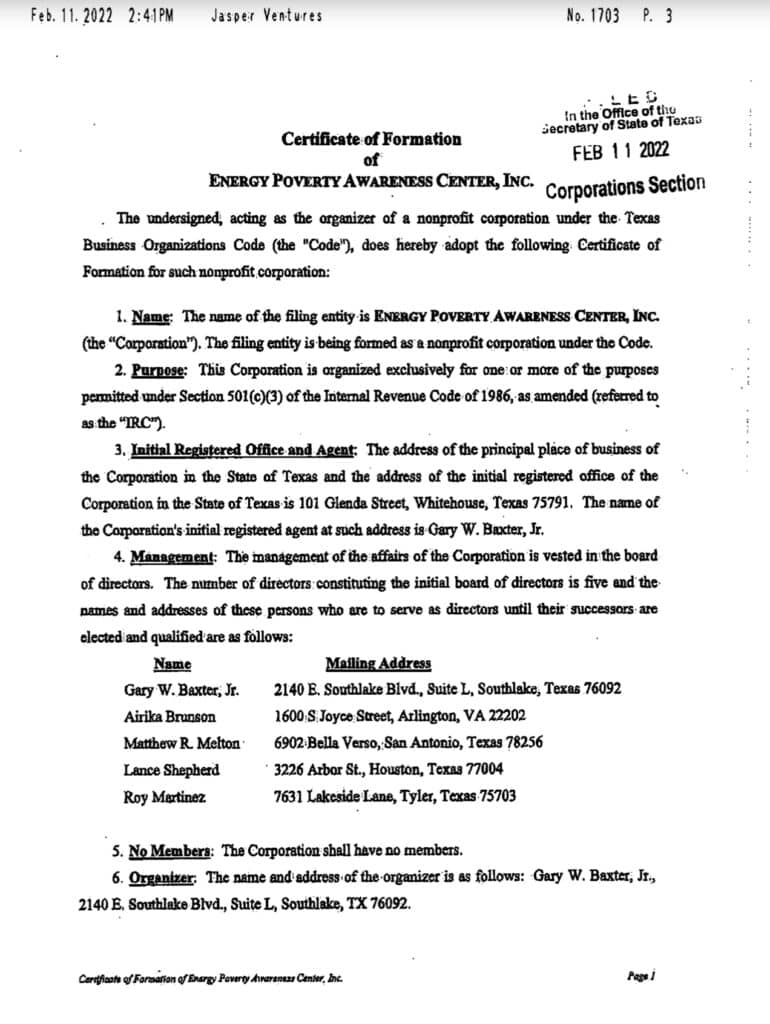The Energy Poverty Awareness Center (EnPAC)
The Energy Poverty Awareness Center (EnPAC) is a Texas-based organization with ties to the oil and gas industry that is advocating against climate change policy in Maryland. EnPAC describes itself as an organization “dedicated to advancing the prosperity of minority communities through reliable and affordable energy solutions – because everyone deserves access to clean, efficient, and affordable energy, regardless of their background or economic status.”
The certificate of formation filed with the Office of the Secretary of State of Texas shows that EnPAC was organized by Gary Baxter, Jr. Baxter was a former professional football player with the Baltimore Ravens and a college football player at Baylor University from Tyler, Texas.
The certificate of formation also shows that EnPAC has four other board members. One of the board members is Airika Brunson, manager of state and local outreach with the American Fuel and Petrochemical Manufacturers (AFPM). Members of AFPM include some of the world’s largest oil and gas producers, including Exxon, Chevron, and Phillips 66. BP discontinued its membership in AFPM in 2020 after a review of its trade associations’ positions on climate change. AFPM regularly contributes to industry front groups and organizations working to block climate policies, including the American Legislative Exchange Council, Competitive Enterprise Institute, and State Policy Network. AFPM also gives money to the Consumer Energy Alliance, which is an industry front group that calls itself the “voice of the energy consumer.”
Other board members of EnPAC are Matthew Melton of San Antonio, Lance Shepherd of Houston, and Roy Martinez of Tyler, Texas. Melton is vice president of EnCAP Flatrock Midstream, a fossil fuel venture capital firm. Shepherd worked at Enable Midstream, which was acquired by Energy Transfer Partners in 2021, and Martinez is a board member of the Tyler Economic Development Council, according to their LinkedIn profiles.
EnPAC’s initial registered office address, 101 Glenda St, Whitehouse, TX 75791 is the same address as a privately owned oil and gas processing company called Jasper Ventures, Inc. Jasper Ventures is also listed at the top of the certificate of formation.

Baxter was in Annapolis, Maryland in January 2024 to launch EnPAC, and Baxter recently wrote an op-ed for the Baltimore Sun that criticized the Climate Crisis and Environmental Justice Act (CCEJ) of 2024 (House Bill 516). Baxter said, “Although it is presented as a way to create more money to support low-income customers and others — important goals — it is actually going to punish some low-income customers at the expense of others because of the energy source they use.”
CCEJ will create a fossil fuel fee collected at the first point of sale in the state and paid by the company transporting the fuel paid by the company transporting the fuel, which the legislation says cannot be passed through to the end user. The funds will be disbursed directly to low- and moderate-income households and energy-intensive businesses, and invested in projects located in environmental justice communities and qualifying local governments for projects to mitigate emissions and build resilience to climate change.
Baxter also submitted written testimony to advocate against the Better Buildings Act of 2024 (Senate Bill 1023 / House Bill 1279). Baxter’s EnPAC joined with utilities and industry groups like the American Petroleum Institute, Columbia Gas of Maryland, Baltimore Gas and Electric, Washington Gas, Chesapeake Utilities, Maryland Building Industry Association, and the Consumer Energy Alliance in voicing opposition against the Better Buildings Act of 2024. The legislation would require all new buildings meet their water and space heating demands without the use of fossil fuels.
Baxter said in a radio interview in February 2024 that Winter Storm Uri inspired him to launch EnPAC. He said, “A lot of minority communities really get disconnected from power because they can’t afford … The energy cost is too much and one of [the] things that we want to look at is how do we lower the energy costs? How do we have reliable and affordable energy as we make [the] energy transition? So we have to factor in all of these things and we don’t want a repeat of Winter Storm Uri to happen to any community.”
Winter Storm Uri was a devastating storm that froze gas-burning power plants and other gas operations in Texas in February 2021, leading to gas price spikes and high utility bills across the country. Because of the price spikes, utilities incurred billions of dollars to purchase methane gas and power, which has resulted in utility customers paying for those costs on their monthly utility bills for years—some as long as 28 years. Utility companies pass fuel costs on to their ratepayers.
The Texas grid operator (Electric Reliability Council of Texas or ERCOT) ordered rolling blackouts, which caused the deaths of many Texans. The joint FERC-NERC report released in November 2021 found gas-fired generators made up 58% of all unplanned outages, derates, or failures during the cold weather event. Utility companies in Texas – specifically Calpine, Vistra, and NRG Energy – all have said gas shortages affected their ability to operate their power plants. The Texas Railroad Commission also didn’t mandate winterization to prevent oil and gas wells from freezing, and failed to ensure that gas producers and pipeline operators sought priority status for power during emergency outages.
EnPAC is not the first group to attempt to use Winter Storm Uri to advance their own political agenda. Power for Tomorrow, a Virginia-based and utility-funded group that opposes efforts to introduce greater competition to monopoly utilities, has used the devastating power outages to advocate against utility restructuring. In Michigan, DTE Energy-connected Alliance for Michigan Power and Consumers Energy-funded Citizens for Energizing Michigan’s Economy launched a Facebook ad campaign ahead of a possible vote on solar energy legislation. The misleading advertisements claimed that “out-of-state special interests” caused the blackouts on the Texas electrical grid. The legislation would have lifted the cap on utility distributed generation programs.

